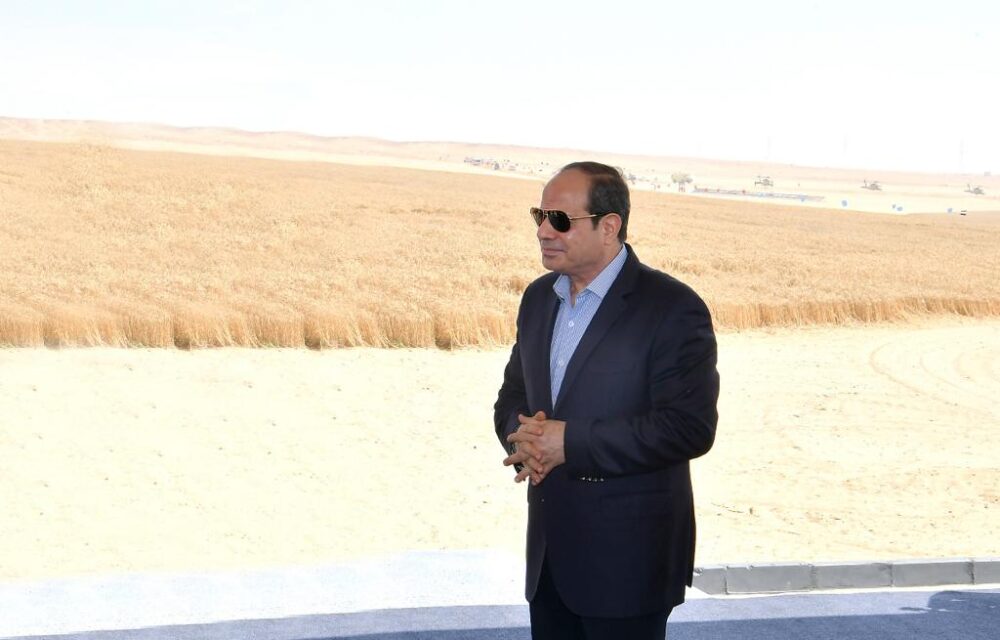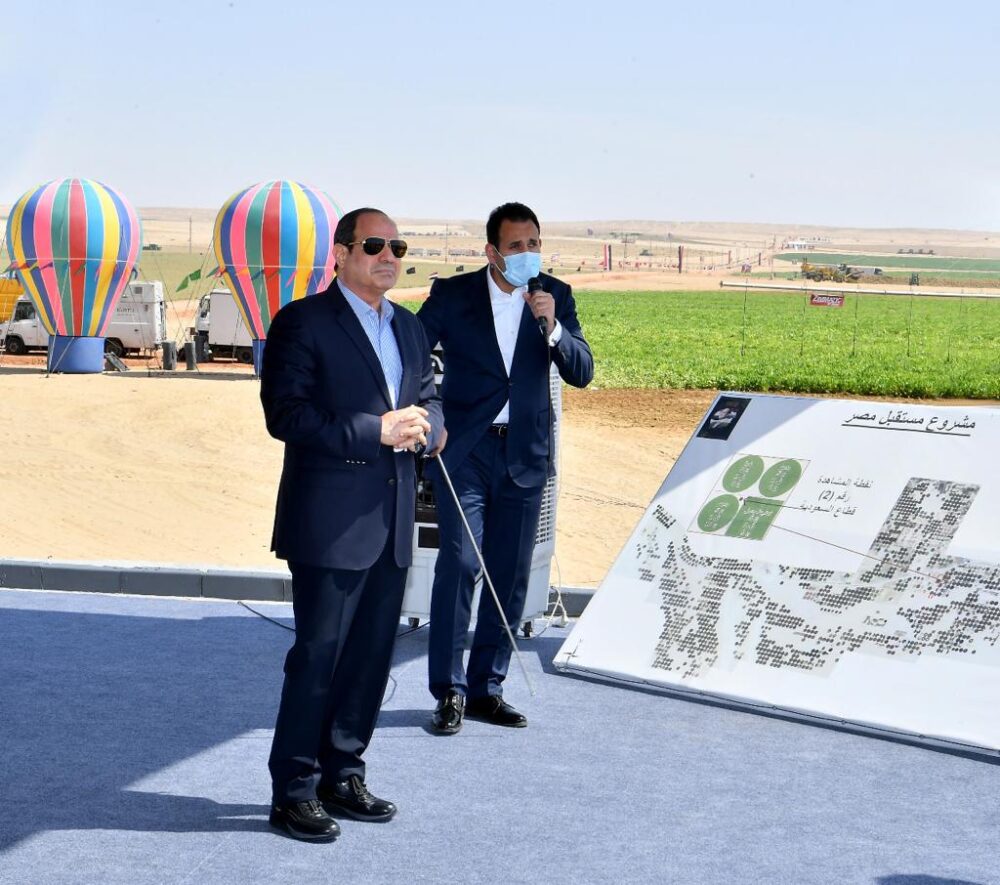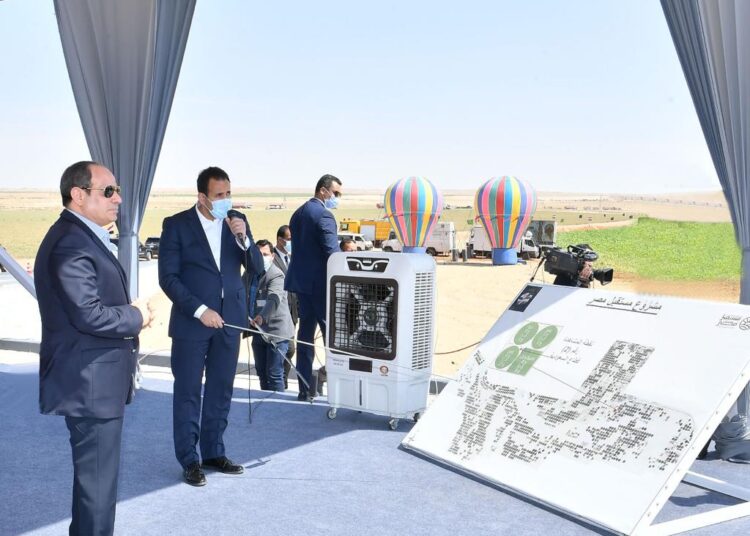CAIRO – Egypt’s President Abdel Fattah El Sisi on Saturday inaugurated “Egypt’s Future” project for agricultural production on Cairo-Dabaa road.
The mega national project aims to maximize production opportunities and provide high-quality agricultural products at suitable prices to citizen.
It is also meant to bridge the gap between production and importation and achieve food security and self-sufficiency of strategic commodities.
The inauguration ceremony is attended by Prime Minister Moustafa Madbouli, Defense and Military Production Minister Mohamed Zaki and a number of ministers and senior state officials.
Director of “Egypt future” for agricultural project Bahaa el Ghannam said the first phase of the four-stage project was fully implemented in an area of 34,000 feddans.
Addressing the inauguration ceremony of the project, which was opened by President Abdel Fattah El Sisi, Ghannam added the second phase will be completed in October.
The third phase will be finished in July, 2023 and the fourth in 2024, he also said noting that both phases cover an area of 700,000 feddans.
The project aims to reclaim about 1,050,000 feddans, he went on to say. “It has a novel vision,” he noted.
The highest quality criteria have been applied during work in the 350,000 feddans that have already been reclaimed and cultivate, Ghannam further mentioned.

The first phase of the project was implemented in two stages which included the establishment of necessary infrastructure and then cultivating the targeted area, the director said.
Modern agricultural and irrigation systems are used in this giant venture, he noted.
Digital scanning is used in the cultivation and production processes, he added.
The project calls for realizing an optimum management of energy and water resources, as the two elements are key to reducing costs, he said.
President Abdel Fattah El Sisi then watched a documentary titled “Egypt’s Future … toward sustainable agriculture”.
The documentary described the “Egypt’s Future” project for agricultural production on the Cairo-Dabaa road as the nucleus of the New Delta agriculture project, pointing out that the political leadership places the task of realising national food security on its top priorities.
It added that the project started by reclaiming 200,000 feddans to provide agricultural production at affordable prices for citizens and fill the gap between the production and imports.
For his part, Agriculture and Land Reclamation Minister El Sayyed el Quseir underlined the importance of “Toshka el Kheir” project in Upper Egypt which represents a model of success in the new republic with regard to the file of food security and attainment of the sustainable development goals under Egypt Vision 2030.
He said that one of the most important goals of the 2030 strategy is maintaining available economic resources and developing them, adding that the state seeks to realize comprehensive development while adapting to climate change.
He said his ministry seeks to increase competitiveness of the agricultural exports in addition to injecting more investments into the agricultural sector and supporting livestock, poultry and fishing production.
In turn, Supply and Internal Trade Minister Ali el Moselhi asserted that the Egyptian state – under directives of President Sisi – has increased its reserves of strategic commodities to ensure that they can last for six months instead of three.

He said the state secured all needed funds for achieving this goal within the framework of efforts to confront the challenges resulting from the coronavirus pandemic and the Ukrainian crisis.
The minister added that “what we are facing today is part of the unprecedented challenges facing the world.”
“Food security is a top priority and the state is focused on securing commodities, ensuring their availability in the local market and monitoring prices.”
He reviewed the strategic projects implemented by the state to maintain reserves of strategic commodities, referring to the national silos project.
He noted that Egypt has silos that can store up to 3.4 million tons and seeks to establish more silos for the storage capacity to reach 5 million tons.
Later, Head of the Armed Forces Engineering Authority Ehab El Far described the “Egypt Future” project for farm production as one of the mega national projects carried out in the country.
The project includes amendments to the courses of canals and digging much more, El Far said.
He added the watercourse in the project extends to about 170 kilometres including 148 open canals, in addition to about 22 kilometres of pipes extended to areas cultivated with sugar beet.
El Far said work on all water lifting stations will be finalized in September as the implementation rate in the western sector of the canals reached 98 percent while operations in the eastern sector have been delayed to probe requests by some residents, whose lands have been expropriated for public use, for compensations estimated at EGP 2.5 billion.






Discussion about this post